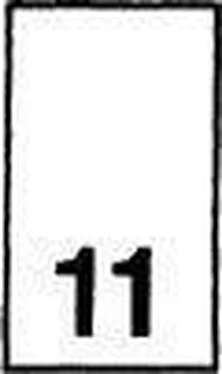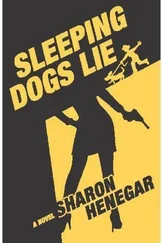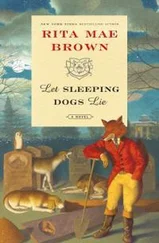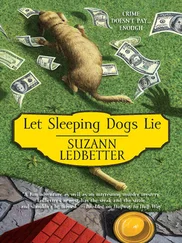Wolf stood still for a moment and listened. He’d made a mess of it, and he still had to get out. The security-service car might buy him the most time left where it was, parked in front and still running. The neighbors would assume that someone whose job it was to respond to gunshots had arrived to take charge, and the police, who knew better, would be cautious about barging in without warning the armed and frightened rent-a-cop they would expect to find inside. He began to wipe his prints from the pistol.
He went to the gun cabinet and opened it. There were five rifles of varying makes and calibers, and a whole section devoted to handguns, all fastened to a blue velvet display board. He spotted a Ruger .38 police special, pulled it off the board and replaced it with the gun he had used to kill the two men, then hurried to the back door of the house.
He stepped out the back door, climbed over the fence into the neighbors’ back yard and kept walking toward the next street. As he moved along beside the house, he heard the first of the sirens. Things were happening too quickly, coming now like punches from an opponent he had underestimated. He listened for the route of the police cars. The electronic blips went on long enough for him to hear them on both sides of him before they stopped. He moved to the wall beside the house, knelt among the garbage cans, swung out the cylinder of the pistol he had stolen and pushed in six rounds. Then he remembered the silencer he had brought with him. It had been machined to fit a weapon of the same make and model. Even if it didn’t silence the report of the new pistol, it would suppress the flash a little. In the darkness this edge might keep him alive.
Carefully he raised himself above the level of the garbage cans and sighted between the houses. He saw the police car on Andalusia pull up behind the North American Watch car, and two uniformed policemen get out. After a moment one of them returned to pull the shotgun out of its mount in his squad car. Wolf turned to look at the street behind him and saw two more police cars glide silently to a stop. They seemed to have practiced a drill to cut off the escape of an intruder in these quiet streets.
He ducked down and concentrated on what he had seen of the neighborhood as he fitted the silencer to the revolver. There were no crowds of pedestrians to lose himself in, and not even a passing car to distract the police. He had to break their choreographed plan, and the only way to do it was to add some element that they hadn’t imagined. He considered starting a fire, but he would have to be nearby when the first flames flickered to life, and would be caught in the light. Then another squad car passed slowly up Andalusia. A spotlight mounted on its window strut swept along the thin trunks of the trim shrubbery, sliced down the spaces between the houses, then shot upward to the roofs. Just before it came abreast of his hiding place, Wolf crouched to let it pass, but as he disappeared into the darkness, he retained an image: the spotlight moving along the fronts of the houses illuminated, one after another, bright reflecting signs that read NORTH AMERICAN WATCH—ARMED RESPONSE.
As soon as the car passed, he came up again. He aimed his pistol at the front window of the house across the street and squeezed off a round. There was a faint spitting noise, and he could see that a spiderweb network of cracks had appeared. Pivoting, he shot the back windows of the next four houses, then ducked down to reload. He was satisfied for the moment. No matter how crude an alarm system was, if it was triggered by sound, motion or simply the dislocation of a conductive tape, it would go off when a window broke.
He resisted the impulse to move his wristwatch up to his face in the darkness to time the “armed response.” Now was his time of greatest danger, while the police were still free to run their prearranged tactic unimpeded. He had to hope it would take them a few minutes to analyze the scene at Peter Mantino’s house before they started to sweep the neighborhood on foot. He listened for footsteps or radio voices to reach him, and then heard more engines. There was the squeal of tires at the end of the street in front of him as the North American Watch cars started to arrive.
A voice on a police bullhorn said, “Pull back out of here. This is a crime scene.” But there was no diminution of the sound of engines or dimming of the glare of headlights. “Yeah, you. Get out of here.”
Wolf decided it was essential to see how the competition was faring, so he moved to the gate that led to the front lawn and looked through the crack by the hinges. There were two cars like the one he had stolen, and they had pulled into the driveways of two of the houses whose windows he had shot out. Men in jeans, flannel shirts and sweatshirts were outside the cars now, carrying an odd assortment of handguns and flashlights.
Two of them stood on the lawn across the street, looking skeptically at a policeman who was walking toward them; a third was already at the side of the house, looking over the fence and aiming his flashlight into the back yard.
As Wolf waited for the mix to get as volatile as it needed to be, he glanced behind him toward the Mantino house. In front of it, he could see another North American Watch car pull up in the middle of Andalusia. A large man got out of it, leaving the door open. He already held a heavy, long-barreled revolver in his hand, as though he had driven with it lying on the seat beside him.
Wolf took three deep breaths to ensure that he had expelled all the carbon dioxide he could. It was carbon dioxide in the blood that made the hands shake. He eased his body upward, rested his arm on the top of the fence and fired a single shot.
The policeman on the lawn jerked in pain, let out his breath in a grunt, then crumpled to the ground clutching his calf. The three security guards looked at him in disbelief, then at each other. Finally it seemed to occur to them that the shot had come from somewhere else. They crouched and swept the horizon around them over their gunsights, looking for a target. But the policeman’s partner was still at the microphone in his car. In his panic he left the external amplifier on, and as he shouted into the radio, his message echoed through the empty streets. “Officer down! This is One X ray Twenty-two. Officer down! Need assistance. Officer down!”
Wolf could see the three security guards now, but he couldn’t see the other policeman in the car. He decided to take a chance. He stood up at the fence and shouted at the frightened guards, “Police officer! Drop those guns!” then ducked and ran along the adobe wall across the front of the house. He knew he must be abreast of the police car now, but he stopped and crouched in the corner of the front yard and listened. “You heard the man,” said the lone policeman. “Drop them!”
Wolf decided he had to increase the sense of danger a little more, or they were going to obey and let the solitary cop get control of the situation. He looked back along the house toward Andalusia Street. He could see that the policemen there had heard either the bullhorn or the radio and were moving toward him through the back yards.
He rolled over the wall to the next yard, then aimed a round over their heads and ducked down. They had seen the muzzle flash aimed in their direction and heard the crack of the bullet breaking the sound barrier as it passed over them, and they responded as he had hoped. There was the blast of a shotgun, followed by eight pistol shots slamming into the corner of the wall. Then he heard three rapid shots fired from the house across the street and judged it was time.
He sprinted to the front of the next house and moved along the façade, then rolled over the next fence and kept moving. There were other sirens in the distance now, all converging on the quiet neighborhood.
Читать дальше












